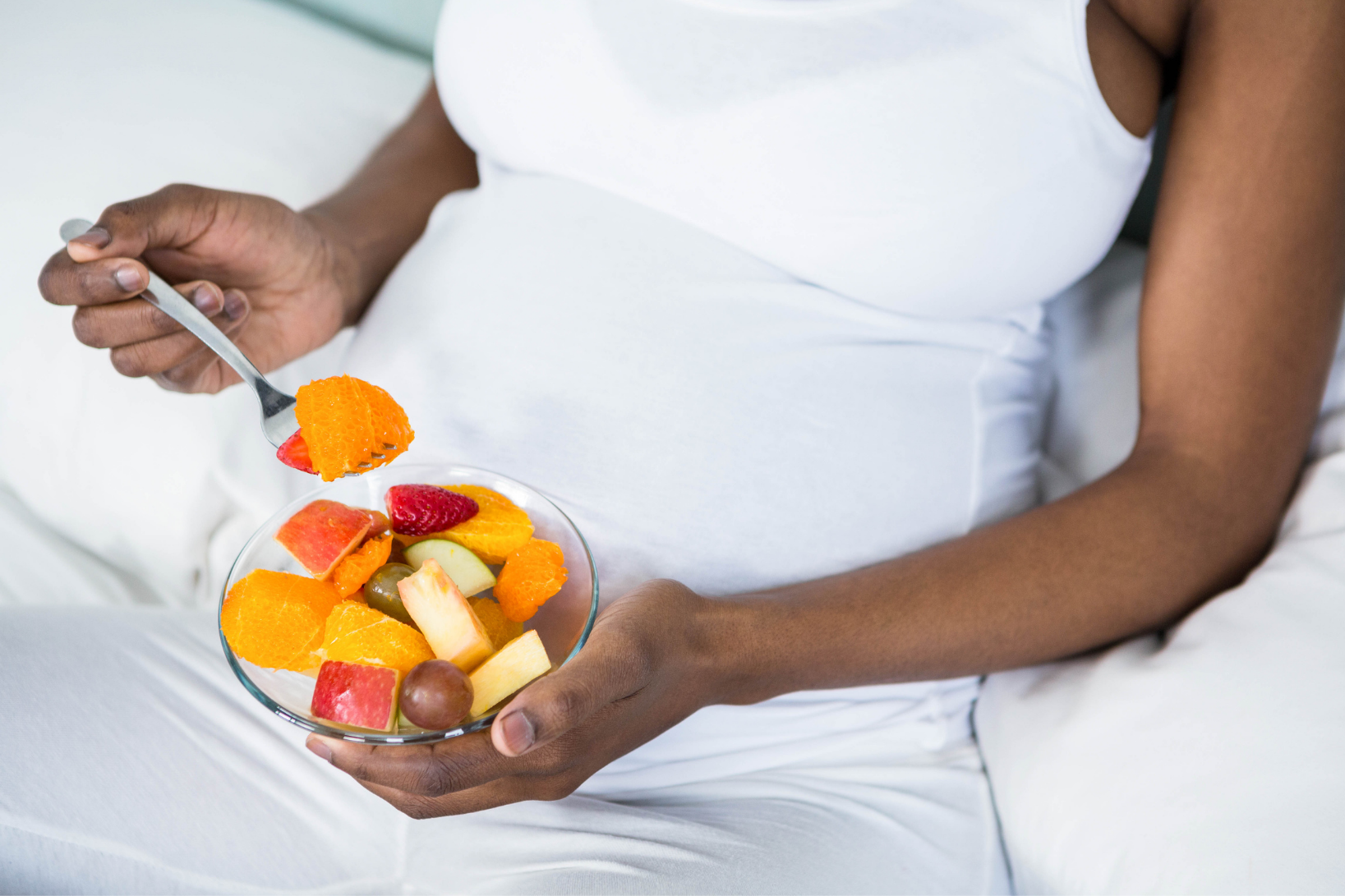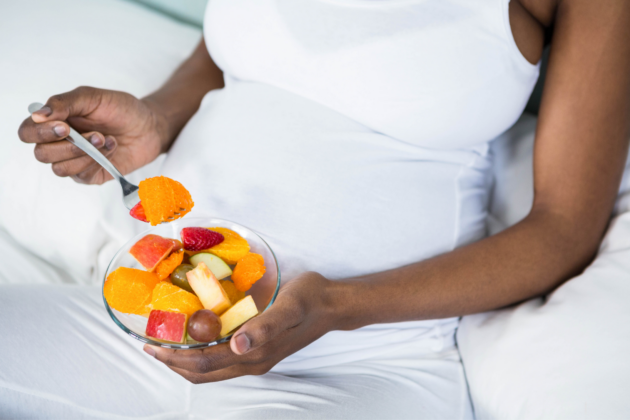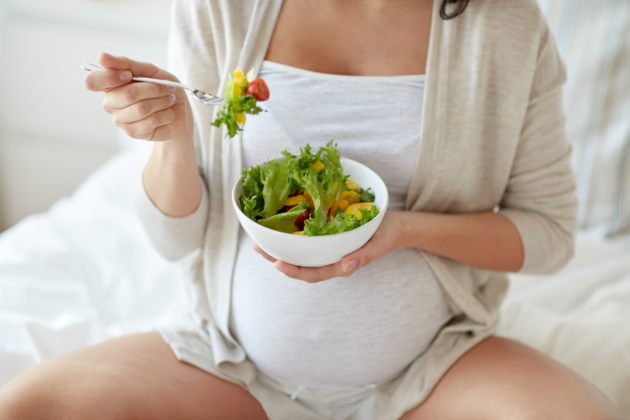How to Cope with Body Changes During Pregnancy
Written by Judy Singer, RDN and Zaya Provider
Body changes during pregnancy is inevitable
There’s one thing that’s true of every pregnancy- your body will change. And while these changes are normal and necessary, they are not always easy to experience physically or emotionally. Bringing a child into the world can feel exciting, surprising, scary, and overwhelming. For some women, it can feel especially difficult to see the outward, physical changes that pregnancy and postpartum bring about.
Whether you’ve struggled with body image in the past or you’re experiencing new feelings about your changing body, there are strategies to support you on your journey and put your mind at ease.
What is actually happening in your body during pregnancy?
First, it can be helpful to understand what’s happening inside your body as it relates to weight gain and weight loss. During pregnancy, you see and feel your baby growing, but at the end of pregnancy, baby only accounts for an average of 5-9 pounds of weight gain. Additional weight comes from the increase in blood volume required during pregnancy, which can add about 4 pounds. Breast and uterus growth can add another 3-5 pounds. The placenta, amniotic fluid and increased body fluid add another 5-6 pounds, and increased fat stores add about 6-8 pounds. All of these things of course lead to a change in your body shape, with the abdomen protruding, breasts becoming larger and fat storage varying across different bodies.
After giving birth, you’ll immediately loose the weight of the baby, amniotic fluid and the placenta. However, many women receive IV fluids during birth, so know that in the immediate days following birth you may be retaining some fluid. Even with some of these pounds gone, your body will still look different. It takes about 6 weeks for your uterus to contract down to its pre-pregnancy size, so it’s normal to have a belly after giving birth. If you choose to breastfeed, the oxytocin your body releases when nursing will help your uterus contract and shrink. Breastfeeding itself is also calorically demanding, so women who breastfeed sometimes find it supports their postpartum weight loss. The important thing to remember is that every body is unique and weight loss may be fast or slow. No matter what your body looks like, anyone who has given birth needs time to rest and recover.
Nutrition is critical during pregnancy
While you can’t control exactly how and where you gain or lose weight, you can make sure you’re taking care of your body with healthy foods. Focus on fresh, whole foods, rather than processed or packaged foods. Get plenty of things like whole grains, leafy greens, a variety of colorful fruits and vegetables, fish, legumes and lean meats.
Establishing a healthy eating pattern in pregnancy will help support baby, maintain your nutrient stores, prevent or reduce problems like cholestasis of pregnancy, and make it easier to stick with healthy eating postpartum.
>> Read More: How a Prenatal Nutritionist Can Help During Pregnancy
Physical activity can help you cope with body changes during pregnancy
Another strategy for coping with physical changes is to keep your body moving. Movement can support healthy pregnancy weight gain and weight loss postpartum, as well as reduce anxiety and depression, improve sleep, and maintain muscle mass. Stay active in whatever way feels good to your body. This may look different from one week to the next. If you’re new to exercise, it’s a great time to establish a walking routine or join a pre/postnatal yoga class. If you’re seasoned, know that modifications will be necessary as you move through this journey. Listen to your body, but keep it moving. Do be sure, of course, to get cleared by your doctor before starting a new exercise routine and before resuming exercise postpartum.
Your mental health is important, too
In addition to the physical ways to support yourself, you’ll also want to hold space for your mental health. Feeling anxious or uncertain about these big changes is normal. Try to keep things in perspective. You’re experiencing a stage of life, but it’s not the rest of your life. Even women who choose not to have children will experience changes to their bodies over time. Trust that you will find a way to be comfortable in your skin whatever stage you’re in. Using meditation or a mantra can be especially helpful.
Surround yourself with a supportive network. You don’t have go through these changes alone, and chances are other women who have given birth have dealt with the feelings you’re experiencing. Talk with family and friends that you trust, and if you can, find a local or virtual pre/postnatal group you can join. Connecting with women at a similar stage of pregnancy can provide support through birth, postpartum, and beyond.
Remember, body changes during pregnancy is actually amazing!
Last, see if you can reframe your thinking by approaching these body changes from a place of wonder and curiosity. How incredible it is that your body can grow and support a tiny human. After all, this is no small feat and it’s a testament to the health, strength and resilience of your body.
While these strategies can help you cope with pregnancy and postpartum on your own, seek mental health support if you need it. Talking your feelings through with a trained professional can have a big impact on your health. If you’re someone who has struggled at any point in life with body dysmorphia or an eating disorder, it’s a good idea to identify a therapist going into pregnancy in case you start to experience symptoms and need support right away.
Zaya Care is a network of maternity care specialists covered by insurance. Judy is a Registered Dietitian and received her Master’s in Public Health Nutrition from New York University. She is passionate about helping women support their bodies through the life-changing experience of starting and growing a family. To book a consultation covered by insurance, click here.
Written by Judy Singer, RDN and Zaya Provider
Body changes during pregnancy is inevitable
There’s one thing that’s true of every pregnancy- your body will change. And while these changes are normal and necessary, they are not always easy to experience physically or emotionally. Bringing a child into the world can feel exciting, surprising, scary, and overwhelming. For some women, it can feel especially difficult to see the outward, physical changes that pregnancy and postpartum bring about.
Whether you’ve struggled with body image in the past or you’re experiencing new feelings about your changing body, there are strategies to support you on your journey and put your mind at ease.
What is actually happening in your body during pregnancy?
First, it can be helpful to understand what’s happening inside your body as it relates to weight gain and weight loss. During pregnancy, you see and feel your baby growing, but at the end of pregnancy, baby only accounts for an average of 5-9 pounds of weight gain. Additional weight comes from the increase in blood volume required during pregnancy, which can add about 4 pounds. Breast and uterus growth can add another 3-5 pounds. The placenta, amniotic fluid and increased body fluid add another 5-6 pounds, and increased fat stores add about 6-8 pounds. All of these things of course lead to a change in your body shape, with the abdomen protruding, breasts becoming larger and fat storage varying across different bodies.
After giving birth, you’ll immediately loose the weight of the baby, amniotic fluid and the placenta. However, many women receive IV fluids during birth, so know that in the immediate days following birth you may be retaining some fluid. Even with some of these pounds gone, your body will still look different. It takes about 6 weeks for your uterus to contract down to its pre-pregnancy size, so it’s normal to have a belly after giving birth. If you choose to breastfeed, the oxytocin your body releases when nursing will help your uterus contract and shrink. Breastfeeding itself is also calorically demanding, so women who breastfeed sometimes find it supports their postpartum weight loss. The important thing to remember is that every body is unique and weight loss may be fast or slow. No matter what your body looks like, anyone who has given birth needs time to rest and recover.
Nutrition is critical during pregnancy
While you can’t control exactly how and where you gain or lose weight, you can make sure you’re taking care of your body with healthy foods. Focus on fresh, whole foods, rather than processed or packaged foods. Get plenty of things like whole grains, leafy greens, a variety of colorful fruits and vegetables, fish, legumes and lean meats.
Establishing a healthy eating pattern in pregnancy will help support baby, maintain your nutrient stores, prevent or reduce problems like cholestasis of pregnancy, and make it easier to stick with healthy eating postpartum.
>> Read More: How a Prenatal Nutritionist Can Help During Pregnancy
Physical activity can help you cope with body changes during pregnancy
Another strategy for coping with physical changes is to keep your body moving. Movement can support healthy pregnancy weight gain and weight loss postpartum, as well as reduce anxiety and depression, improve sleep, and maintain muscle mass. Stay active in whatever way feels good to your body. This may look different from one week to the next. If you’re new to exercise, it’s a great time to establish a walking routine or join a pre/postnatal yoga class. If you’re seasoned, know that modifications will be necessary as you move through this journey. Listen to your body, but keep it moving. Do be sure, of course, to get cleared by your doctor before starting a new exercise routine and before resuming exercise postpartum.
Your mental health is important, too
In addition to the physical ways to support yourself, you’ll also want to hold space for your mental health. Feeling anxious or uncertain about these big changes is normal. Try to keep things in perspective. You’re experiencing a stage of life, but it’s not the rest of your life. Even women who choose not to have children will experience changes to their bodies over time. Trust that you will find a way to be comfortable in your skin whatever stage you’re in. Using meditation or a mantra can be especially helpful.
Surround yourself with a supportive network. You don’t have go through these changes alone, and chances are other women who have given birth have dealt with the feelings you’re experiencing. Talk with family and friends that you trust, and if you can, find a local or virtual pre/postnatal group you can join. Connecting with women at a similar stage of pregnancy can provide support through birth, postpartum, and beyond.
Remember, body changes during pregnancy is actually amazing!
Last, see if you can reframe your thinking by approaching these body changes from a place of wonder and curiosity. How incredible it is that your body can grow and support a tiny human. After all, this is no small feat and it’s a testament to the health, strength and resilience of your body.
While these strategies can help you cope with pregnancy and postpartum on your own, seek mental health support if you need it. Talking your feelings through with a trained professional can have a big impact on your health. If you’re someone who has struggled at any point in life with body dysmorphia or an eating disorder, it’s a good idea to identify a therapist going into pregnancy in case you start to experience symptoms and need support right away.
Zaya Care is a network of maternity care specialists covered by insurance. Judy is a Registered Dietitian and received her Master’s in Public Health Nutrition from New York University. She is passionate about helping women support their bodies through the life-changing experience of starting and growing a family. To book a consultation covered by insurance, click here.
















